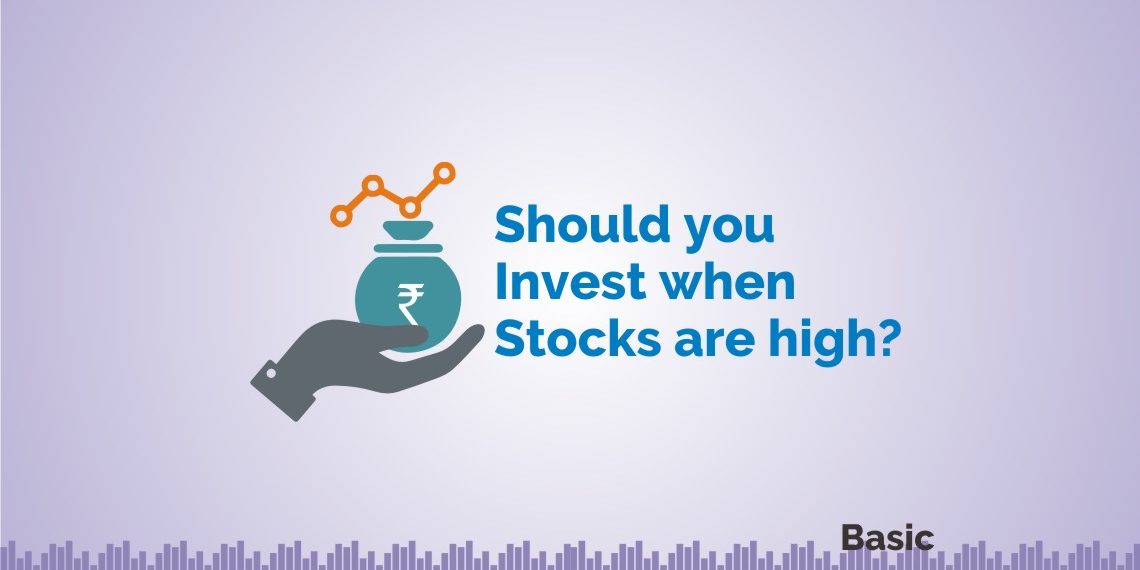It’s important to keep your head when making long term investment decisions. To learn more about the basics of long-term investments, join the Online NSE Academy Certificate in Research, Trading & Advisory course on Elearnmarkets.
With stocks touching new highs, the stakeholders are in a state of frenzy. The investors are hit with a confusion of a new extreme. Some are skittish, while the others are thrilled. There are two emotions prevailing in the market; one, which expects the bull market to reach greater highs while the other, fear a crash. Below are few guidelines to help you capitalize on the situation.
Also read: 5 Strategies to Follow When Fear Runs High in Stock Market
Determine investment tenure (Consider long term investment):
Investments are made keeping in mind a certain goal and objective. The tenure should extend till your investment goal is accomplished. This is known as the “investment horizon”. For instance, if you are investing in stocks to sow benefits after retirement, your long term investment tenure is predetermined. It would be evaluated timely, with alterations in your investments. The tenure of your long term investment shall be such that one can employ it as per the set purposes.
The tenure of a long term investment also depends on the type of investment. When the markets are at such highs, it’s essential to consider a long term investment. It acts as a safety net from volatile conditions and gives the advantage of averaging market entries over the period.
For someone who is new to the game, it’s advisable to choose equity mutual funds. Not only do they provide a similar experience in long term investment, but also takes off the pressure of managing it professionally. One may consider starting a Systematic Investment Plan (SIP) in equity funds, where bets are placed in not only smaller magnitudes, but also consistently.
To effectively partake in long term investment, one must determine their percentage of monthly contribution or their lumpsum amount. One must be realistic while making these decisions. It may change from time to time and must be suitable for a long term investment, keeping in mind the goal.

Keep emotions out:
To master the art of investment, it’s important to control our emotions and understand the market sentiments. For a new investor, it’s natural to buy at a market high with the optimism of a bull scenario. This opportunity seems like a ‘can’t-miss’ one. But it’s important to acknowledge the uncertainty of the scene.
Also, for instance, if someone is afraid of market crashing, they might fear losses and get out there. But, they must recognize that it is good and it is true; it’s not the first time indices have portrayed positive trends.
To encounter these emotions, it is healthier to get into a systematic plan for long term investment so that your returns are averaged out to a greater advantage in the long run.

You may also read: 7 insights I wish I had when I started my trading career
Consider future growth potential:
Deciding the long term investment sure needs to be future-oriented, but only after considering the past trend. The future is uncertain but is estimated only after examining past behavior. The growth potential of the stock can be ascertained after reviewing the company’s fundamentals and market actions.
Some important indicators are:
- Earnings per share (EPS): It’s amount each share would get if a company paid out all its profit to the shareholders. Example: If profit is Rs.10,000 and shares are 100, EPS is Rs.100.
- Price-Earnings (P/E) Ratio: It’s calculated by dividing the current price per share of a company’s stock by the company’s EPS. Example: A company’s stock currently sells for Rs.100 per share and its earnings per share are Rs.5. That means it has a P/E ratio of 20 (Rs.100/Rs.5).
- Dividend Yield: It’s calculated by dividing the annual dividend per share by the price per share. Example – 2 stocks each annually pay a dividend of Rs.1 per share. Company X’s stock is trading at Rs.40 a share, Company Y’s stock at Rs.20 a share. Company X has a dividend yield of 2.5% (1/40), while Company Y’s is 5% (1/20).
- Capital Structure (Debt-Equity): It’s the ratio of company’s debt to equity in its capital.
- Compound Annual Growth Rate (CAGR): It’s the mean annual growth rate of an investment over a specified period of time longer than one year. Example: If your investment is Rs.10,000 and in 3 years it grew to Rs.19,500. Then CAGR is calculated by (19,500 /10,000)1/3 – 1 = 24.93%.
Learn Patience, Discipline, and Persistence:
Everybody thinks they’re patient or disciplined before they start trading. Once the market fervor intensifies, all yoga classes go to waste. But staying patient and persistent is vital to the success of the long term investment.
To be honest, staying put till the storm passes is the most important trait to survive in trading. For a long term investment to reap benefits, one must suppress the urge to be impulsive and take irrational steps. For instance, cutting winners too early or even letting losers run for too long.
Trading follows a learning curve and to be successful, one needs to sit through it. In trading, as well as in life, instantaneous gratification becomes the enemy of success. One needs to acknowledge that virtues like these take time. Right opportunities will present itself when the time is right, but one needs to be patient enough to grasp it.

Bottom Line:
When the stock market is on a high, one must tread carefully. It’s safe to choose a long term investment but one must decide the tenure considering its goal, the type of the investment as well as it’s financial capacity. It is important to filter out any hindering emotion that may cloud your better judgment. Long term investment requires one to choose stocks after carefully considering all available indicators of its future growth potential. Lastly, one must understand the need to stay calm in a market that drives up your adrenaline instantaneously. One must master the virtue of patience, discipline, and persistence. All of this, while keeping in mind your appetite for risk and ability to manage it. To further explore your options, get a financial advisor to guide you through each step of becoming rich.









Thanks for sharing excellent informations. Your website is very cool. I’m impressed by the details that you’ve on this blog. It reveals how nicely you perceive this subject. Bookmarked this website page, will come back for more articles. You, my friend, ROCK! I found simply the information I already searched all over the place and just could not come across. What a perfect web site.